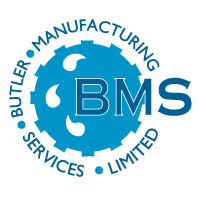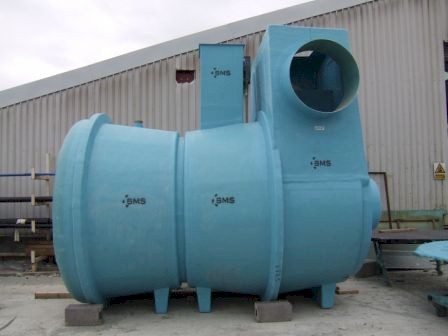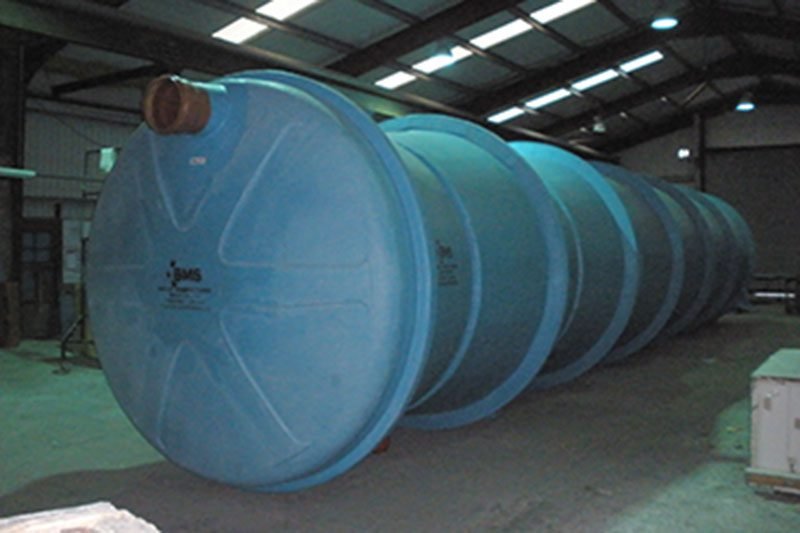Petrol/Oil Bypass, Full Retention & Forecourt Interceptors
BMS manufactures a full range of Petrol & Oil Interceptors (Separators) from 1,000 – 100,000 L including Full Retention, By-Pass & Forecourt Interceptors for all requirements. All BMS Interceptors are manufactured under an NSAI verified ISO 9001:2015 Quality Management System & to the European Standard; EN 858 1&2. BMS can match any inlet/outlet pipe size and offer a quick turnaround/free design advise.
Petrol/Oil Interceptor Terminology
Full Retention Interceptor
Under normal flow conditions, the BMS Full Retention Interceptors are designed to retain the full contents of an oil spill, contamination or silt up to flows of 50 mm/hr.Bypass Interceptor
Designed to treat flows of up to 5 mm/hr. This covers 99% of rainfall.Class 1 Interceptor:
Designed to achieve a concentration of 5 mg/l of petrol/oil at discharge under normal conditions, includes a coalescer. A Class 1 Interceptor is usually required for discharge to any surface water.Class 2 Interceptor:
Designed to achieve a concentration of 100 mg/l of petrol/oil at discharge under normal conditions. Normally used when discharge is to a foul sewer.Petrol/Oil Separator:
Another word used to describe an interceptor.NS: Nominal Size.
Each interceptor is allocated a nominal size based on EN858. This will indicate the nominal flow that the interceptor is sized for e.g. 4 l/s. A full retention interceptor with a capacity of 4 l/s would be designated NS04 while a By-Pass interceptor with the same capacity would be designated NSB04.Coaelscer Filter
A custom designed filter consisting of polyurethane open cell foam enclosed in a perforated PVC housingAutoclosure
A specially designed ball valve that will close the outlet of an interceptor in the event of hydrocarbons being present.
How does a Petrol Interceptor Work?
Surface water from sealed surfaces flows away via drainage to receiving waters, sewers or to soakaways. If there is potential for petrol/oil spills onto these surfaces e.g. car parks, forecourts, roads, garages and depots, it is vital to intercept/separate any petrol/oil contaminants to prevent damage to the surrounding environment. The petrol/oil is then held within the interceptor for safe removal. BMS Petrol/Oil Interceptors perform this role. BMS manufactures a full range of interceptors for all applications. All BMS Interceptors are manufactured in rot proof and durable Glass Reinforced Plastic (GRP) It is critical that the correct interceptor is selected depending on a sites particular requirements to ensure that they function correctly. A number of different factors need to be taken into account when selecting the correct interceptor.
Please contact us for free advice on to the best interceptor to suit your needs.
Surface water from sealed surfaces flows away via drainage to receiving waters, sewers or to soakaways. If there is potential for petrol/oil spills onto these surfaces e.g. car parks, forecourts, roads, garages and depots, it is vital to intercept/separate any petrol/oil or silt to prevent damage to the surrounding environment. The petrol/oil/silt is then held within the interceptor for safe removal. BMS Petrol/Oil Interceptors perform this role. It is critical that the correct interceptor is selected depending on a site’s particular requirements, to ensure that they function correctly.
Why BMS Petrol/Oil Separators?
BMS are the largest Irish producer of Petrol/Oil Interceptors, all manufactured in our state of the art ISO 9001:2015 Quality Irish factory. BMS interceptors have been protecting water supplies on 1000s of sites in Ireland and abroad for over 30 years.All BMS interceptors are manufactured in corrosion/rot proof Glass Reinforced Polyester (GRP/FRP) using only Lloyds rated resins and have a design life of 50+ years. BMS can match any inlet/outlet pipe size and offer a quick turnaround.BMS are a full service manufacturer; we can provide full design advise including recommending the correct interceptor for your site along with drawings and calculations. The BMS Interceptor range is part of our ‘one stop shop’ for all your surface water management requirements from design to installation.
Types of BMS Petrol/Oil Interceptor
Full Retention Petrol/Oil Interceptor
Used when there is a risk of regular contamination of surface water runoff with petrol/oil and/or the risk of larger spills e.g. vehicle maintenance areas, heavy goods parking areas or where frequent vehicle manoeuvring takes place.
Designed to treat the full flow delivered by a drainage system up to 50 mm/hr.
By-Pass Petrol/Oil Interceptor
Used when there is a risk of infrequent light contamination of surface water run off with petrol/oil and/or the risk of only small spills e.g. car parks, airports, industrial estates, roads and other low risk areas.
Designed to treat flows of up to 5 mm/hr. This covers 99% of rainfall.
Forecourt Filterceptor
The BMS Filterceptor range of Forecourt Interceptors is used when there is a significant risk of contamination of surface water run off with petrol or oil and/or a large risk of spills e.g. Petrol Stations, Haulage Fuelling Yards & Fuel Depots.
Designed to contain the full contents of fuel tanker compartment. Includes closure mechanism.
How to Select the Correct Petrol Interceptor
Firstly, you need to determine if you require a Bypass or a Full Retention Interceptor and if then if you require a Class 1 or Class 2 Interceptor.
After selecting the interceptor class and type, the selection of the correct size of interceptor is based on the flow into it based on rainfall onto a given impermeable surface area, this is known as nominal size or NS.
Each interceptor is allocated a nominal size based on EN858;2002 1-2 the European Standard for Interceptor Design and Sizing. This will indicate the nominal flow that the interceptor is sized for e.g. 4 l/s. A full retention interceptor with a capacity of 4 l/s would be designated NS04 while a By-Pass interceptor with the same capacity would be designated NSB04.
Example 1
An interceptor required for a 34,000 m2 car park discharging into a local authority surface water sewer. As there is a low chance of oil spillage a Bypass Interceptor would be most appropriate. As discharge is to a surface water sewer a Class 1 Interceptor, which is designed to achieve a concentration of 5 mg/l of petrol/oil at discharge under normal conditions and includes a coalescer and a closure mechanism is most appropriate.
Based on EN858 a drainage area of 34,000 m2 gives a nominal size (NS) of 47 l/s.
So in this case BMS would select a BMS PB5 Class NS 47 l/s Bypass Interceptor, which is the closest available in our range. Please note that the Nominal Size of a Bypass Interceptor can also be denoted as NSB e.g. NSB; 31 l/s.
Example 2
An interceptor required for a 1,700 m2 fuelling area discharging direct to a foul sewer Due to the high risk of fuel spillage a Full Retention Interceptor designed to contain the full contents of a fuel spill is required. As discharge is to a foul sewer a Class 2 Interceptor, which is designed to achieve a concentration of 100 mg/l of petrol/oil at discharge under normal conditions is most appropriate.
Based on EN858 a drainage area of 1,700 m2 gives a nominal size (NS) of 31 l/s.
So in this case BMS would select a BMS PF8 Class 2 NS 31 l/s Full Retention Interceptor, which is the closest available in our range. Please note that the Nominal Size of a Full Retention Interceptor can also be denoted as NSF e.g. NSF; 31 l/s.
Free Interceptor/Surface Water Design Service
If you have a project that requires a Petrol/Oil interceptor BMS offer free design advise. Indeed, BMS offer a free design service for your complete surface water management system and also can provide a comprehensive 'one stop shop' quotation from design to installation for all surface water management products.
We have 30+ years experience in surface water management and are the largest Irish manufacturer of Petrol/Oil Separators. BMS Separators are installed under most Irish roads/motorways!
Please contact BMS if you would like to discuss your interceptor or surface water project.
Three Chamber Full Retention Interceptors
BMS Three Chamber Full Retention interceptors are available in a wide range of sizes varying from 1,100 L up to 100,000 L. Larger sizes can be accommodated on order. Full Retention interceptors are used in areas where there is a high risk of petrol/oil contaminating the on-site drainage e.g. Fuel Distribution Depots, Scrap Yards, Car/ Vehicle Workshops and Washdown areas.
Operation
Under normal flow conditions, the BMS Full Retention Interceptor is designed to retain the full contents of an oil spill or contamination up to flows of 50 mm/hr.
By-Pass Interceptors
A requirement of full retention interceptors is that they must have a large enough capacity to prevent pollutants being flushed through the unit during storm conditions.
In the case of larger drainage areas such as car parks, airports and industrial estates, Full Retention Interceptors are not practical, as they would require very large full retention petrol interceptors, making production, installation and handling more costly. A practical and economical solution to this problem is the BMS Bypass Interceptor range.
Operation
Under normal flow conditions, the BMS Bypass Interceptor will separate and retain silt and pollutants such as oil and petrol prior to discharge.
In storm conditions, when periods of peak flow are experienced, it will treat a certain percentage of the maximum flow whilst at the same time allowing the excess to by-pass the retention chamber of the unit.
As contaminated water enters the first chamber, pollutants float to the surface. Due to the unique internal design; vortex formation occurs at the by-pass pipe resulting in the pollutants being skimmed off the surface and become trapped allowing the uncontaminated water to discharge from the interceptor.
When storm flows intensity increases, the vortex pipe floods thus restricting the flow from the first chamber to the retention chamber. As a result of the increase in water level in the first chamber, hydraulic pressure increases, forcing the majority of the water through the by-pass weir and into the chamber to discharge.
Filterceptors
BMS have developed their 'Filterceptor' range of Forecourt Separators in line with the proposed new CEN European Standard for light liquid separators. It doubles both as an interceptor and separator of pollutants on the petrol station forecourt where there is a significant risk of petrol or oil spillage. The Filterceptor is designed to contain the maximum contents of a spillage from a fuel delivery tanker compartment.
BMS Filterceptors Forecourt Interceptors
Doubles as both an Interceptor and a Separator of pollutants on the petrol forecourt, where there is a significant risk of petrol or oil spillage. They are designed to contain the maximum contents of a spillage from a fuel tanker compartment.
Operation
The Filterceptor unit contains an automatic shut-off valve and coalescer and is specifically designed for applications where the requirement for hydrocarbon pollutant concentration from the unit is 5 mg/l or less. When a change in the specific gravity of the liquid present in the unit occurs or when water present is replaced by less dense hydrocarbon pollutants a specially calibrated ball will drop and seal the outlet from the Filterceptor. The coalescer filter consists of a polyurethane open cell foam enclosed in a perforated PVC housing. Untreated flow cannot leave the Filterceptor without first passing through the coalescer filter. An optional extra is an oil level probe and alarm system.
Maintenance
To ensure that BMS Interceptors continue to operate at maximum efficiency, regular maintenance should be carried out. Coalescer filters and automatic shut off units are easily removable to facilitate general inspection, cleansing, and maintenance. If you have any queries regarding your interceptor please contact BMS.
Installation
Full installation instructions are provided with each BMS Interceptor. They are easily connected to any size of pipework. Access shafts and vents are available in order to accommodate varying depths of pipework. BMS can supply of full range of oil level alarm systems complying with EN858. Please contact us for more information.
Design, Construction & Quality
All BMS Interceptors are manufactured in GRP and each finished unit undergoes rigorous testing (including individual hydraulic tests) by our Quality Control Department before leaving our premises. BMS operate an NSAI verified ISO 9001:2008 Quality Management System.
About BMS
BMS is a quality manufacturer of package products for wastewater and stormwater treatment:
Established: 1986
Global Reach: Exported to over 50 countries.
Family Business: A third-generation company with deep expertise.
BMS Product Range
BMS provides a wide array of surface water and wastewater treatment products, including:
View the full product catalogue here
Additional Services by BMS
Free Design Service: For sewage treatment, pump stations, and surface water management.
Operation and Maintenance: Full services for existing installations, including repair, advice, and testing.
Free CPD Presentations: Available for sewage treatment and surface water management, delivered at your location.
We would be delighted to discuss any requirements you might have, and we are available to meet you at your convenience. Contact us today.
© Butler Manufacturing Services 2024.


